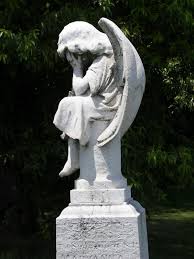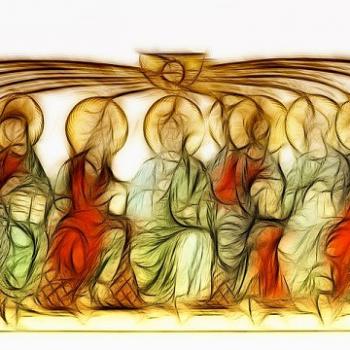This week is Spring Break at my college–a week I am using to catch up on rest, grading, and to plan for the second half of the semester. In one of my ethics classes we ended with a cliffhanger in our last class just before break. We are in the early classes of a unit called “Does Ethics Have Anything to Do with God?”; the text for the day was an interview between a theist philosopher and an atheist philosopher.
It was a remarkably polite and generous conversation with each person recognizing the strengths and weaknesses of the other person’s position. When pressed by the theist to justify her position, the atheist said,
I find the “argument from evil” overwhelming—that is, I think the probability that the world we experience was designed by an omnipotent and benevolent being is a zillion times lower than that it is the product of mindless natural laws acting on mindless matter.
Accordingly we spent most of the class setting up the problem of evil, which is simple to state and devilishly difficult to solve.T he problem involves four claims that are logically incompatible:
- God is all-good (omnibenevolent)
- God is all-knowing (omniscient)
- God is all-powerful (omnipotent)
- Evil exists
The first three claims are fundamental to traditional theistic belief, while the truth of the fourth claim is self-evident to anyone who is the least bit observant of our surrounding world. Logically, all four claims cannot be true simultaneously. Pick your favorite three to double down on, and the fourth has to be false. Which sucks, because any committed theist who is also an observant human being wants to affirm all four claims.The problem is most often e xpressed narratively along the following lines:
If the God who created the world is omnipotent (all powerful) and omnibenevolent (all good), why is there so much suffering and evil in the world? Notice, as an aside, that the problem only exists for those who are committed to the simultaneous truth of all of the first three propositions.
Anyone who has ever thought about the problem of evil undoubtedly knows the outlines of several possible “solutions” to the problem that have been suggested over the centuries. After setting up the problem, I asked my students to list some possible solutions to the problem of evil that they had studied in previous classes (students at my college are required to take two theology classes as part of their required core curriculum courses). In short order they came up with several.
**God’s ways are higher than our ways. To which one might say, no kidding! But this is not an response to the problem of evil. Rather, it is simply a religiously pious way of saying “I don’t know.” It hardly will be satisfactory to anyone who believes that God invites human beings to ask questions and use the investigative faculties that God created them with. It is certainly possible to conclude that God’s ways are mysterious after full investigative engagement with the world that we are part of and that God created, but as a starting point it is equivalent to refusing to do the work.
**Suffering and pain are character builders. This certainly has been the experience of most people over the centuries. Growth occurs because of struggle. Pete Enns notes that “suffering is the cost of doing evolutionary business.” Change through competition and struggle is embedded in the very fabric of the world we inhabit. This, however, is simply kicking the can down the road. If God is omnipotent, God could have created a world in which progress and growth were possible without suffering and conflict. And yet God didn’t create that world. Why not? The answer to the question will necessarily challenge the presumed omnibenevolence of God. Or if we say that God couldn’t have created a world in which growth was possible without struggle and suffering, then we are challenging God’s omnipotence.
**Goodness cannot be fully understood without its opposite. This is a favorite of my students (I’m sure some authority figure at some point has dropped it on them), but it’s a relatively weak response to the problem of evil. Claiming that God created human being as incapable of understanding goodness without evil and suffering to compare it to immediately raises a serious question mark over either God’s goodness or God’s omnipotence. Either God could have created us capable of fully engaging with goodness without accompanying suffering—and didn’t (lack of goodness) or God couldn’t create us that way (lack of power).
**Evil and suffering don’t truly exist. Believe it or not, this has been a favorite of some of the heavy-hitting Christian theologians over the centuries, including St. Augustine. The idea is that evil is a lack of goodness, but does not have substantial and existential reality in its own right. Tell that to the victims of the Holocaust. Enough said.
**Evil and suffering are due to the misuse of human free will. This is, in various versions, by far the most popular response to the problem of evil—with good reason. For our purposes, free will is the ability to choose between various available options without being forced or coerced to choose any one of them. In other words, one chooses between options and acts on that choice—but one could have chosen otherwise.
Given that for many people (including myself), this ability is at the core of what we understand human nature to be, any solution to the problem of evil must take this fundamental human capacity seriously. And if human beings do truly have the capacity to choose between good and evil, then it is a given that they will on occasion, perhaps frequently, choose evil. Accordingly, the existence of evil can be explained by our misuse of free will.
But not so fast. As popular as the “free will solution” to the problem of evil is, a couple of my students pointed out that several problems remain. First, this only addresses evil that can be traced back to human actions based on human free choice. This is often called “moral evil,” and there is more than enough of it to go around as anyone who has lived a human life knows.
But there is an untouched category called “natural evil” that this solution does not address. What of the evil and suffering that cannot be traced to human actions, such as that which accompanies natural disasters? The normal operations of our physical world produce events (hurricanes, earthquakes, tornadoes, flood, drought, and so on) that human activity cannot be held responsible for. Yet natural evil exists. Why did God create a world like that?
Furthermore, if human beings truly do have free will, it makes sense to ask if God knows what I will choose with my free will before I choose it. Since God is omniscient, the answer must be “yes.” But if my will is truly free and I could have chosen otherwise than what I did choose, then God cannot have known ahead of time what I would choose (or my choice would not have been free). So the free will “solution” requires my giving up on God’s omniscience.
This is where we left our conversation in class last Thursday as time ran out–we’ll pick it up in our first class after break next Monday. Stay tuned for a progress report next Friday!













